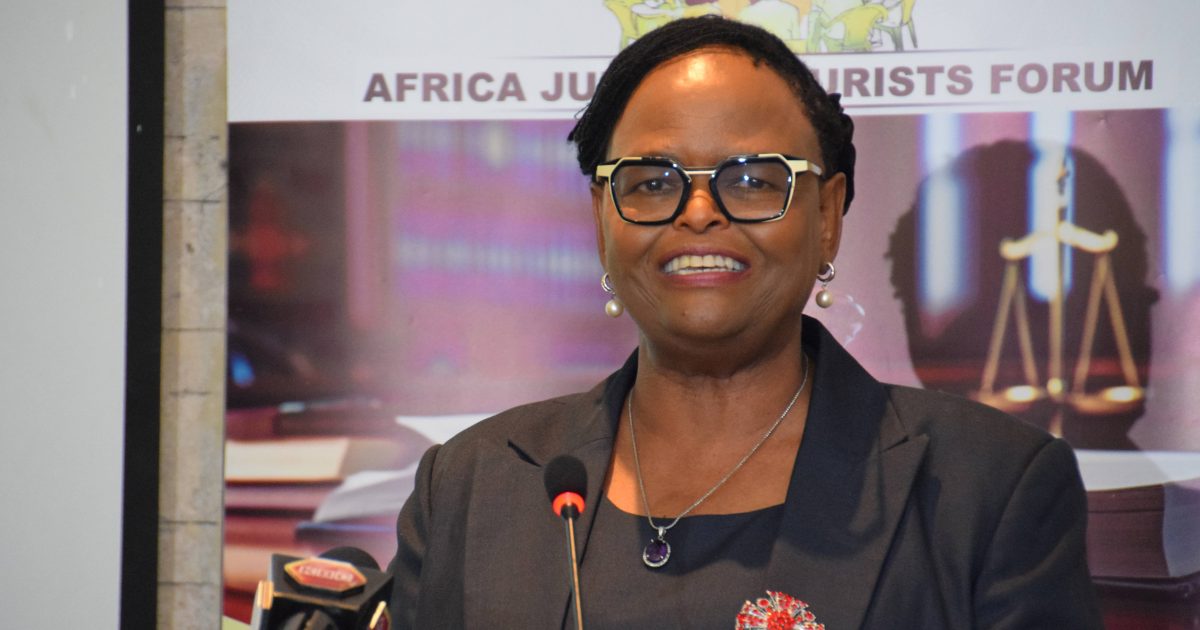Chief Justice (CJ) Martha Koome has called on Judiciaries to engage more actively with communities to identify and address the root causes of conflict before they escalate to full-blown disputes in order to promote social harmony.
Koome insisted that going upstream to promote social harmony in the communities is one of the key roles that African Judiciaries ought to play to fulfil their duty under Aspiration 3 of the AU Agenda 2063 – Good governance, Democracy, Respect for Human Rights, Justice, and the Rule of Law.
Other key roles, according to the CJ, that Judiciaries ought to play to fulfill this aspiration include purposive interpretation of laws, protection of human rights, robust judicial review and enhancement of accountability.
Speaking at the All Africa Judges and Jurists Summit in Nairobi the CJ observed that for far too long, African Judiciaries have positioned themselves primarily as downstream actors, intervening only after grievances have escalated into full-blown disputes.
Justice Koome added that instead of waiting for conflicts to land in the courtrooms, time has come to shift the downstream paradigm and adopt a more proactive, upstream approach.
“By actively engaging upstream, African judiciaries can help foster peace, prevent disputes, and ultimately contribute to more cohesive and harmonious communities across the continent,” she reiterated.
Koome emphasized that this shift will transform the role of African Judiciaries from being mere arbiters of disputes to becoming enablers of lasting social transformation.
In order to achieve this, the CJ implored, there is need to strengthen and expand the role of Court User Committees (CUCs), which serve as vital platforms for courts to interact with the public, understand their justice needs, and collaborate on solutions that are both timely and effective.
“These Committees can foster ongoing dialogue between the Judiciary and community members, allowing us to be more attuned to local concerns and grievances,” explained Koome.
Additionally, the CJ noted that African judiciaries must also embrace and promote the multi-door approach to justice which means offering a variety of pathways to resolve disputes, including Mediation, Conciliation, and Alternative Justice Systems (AJS).
She argued that traditional justice mechanisms, which have long been embedded in our cultures, offer valuable methods of conflict resolution based on reconciliation, communal dialogue, and restorative justice.
These approaches, she maintained, not only alleviate the burden on formal court systems but also promote deeper, more sustainable social harmony by addressing underlying issues rather than simply adjudicating the symptoms of conflict.
To continue playing these critical roles, Koome believed certain preconditions such as judicial independence, impartiality and objectivity as well as public trust and confidence must be met to ensure that our Judiciaries are well-equipped to deliver on their mandate.
“Our ability to protect the rule of law and human rights hinges on our independence. Judicial officers must be free from external pressures, political interference, and undue influence. In addition, financial independence is equally vital; without adequate budgetary resources, judiciaries are hamstrung in their ability to deliver justice effectively. Therefore, we must join hands to champion adequate budgetary allocations and autonomy by Judiciaries in managing their budgets,” urged the CJ.
She voiced that courts must serve all citizens impartially adding that the essence of judicial power is not to serve the interests of any group but to protect constitutionalism and uphold justice, because objectivity in adjudication fosters public confidence in the judiciary.
Africa Judges and Jurists Forum (AJJF) Secretary General (SG) Martin Okumu-Masiga said the theme challenges participants to reimagine the role of judiciaries in shaping the socio-economic and political landscape of Africa.
“It is clear to me that the theme views ‘judiciaries as catalysts for change’. This is so, because by focusing on the judiciary, the theme emphasizes its role not just as a protector of rights but as a stimulus for broader societal transformation,” opined the SG.
The All Africa Judges and Jurists Summit, organized by Kenya Judiciary Academy, has brought together current and former Chief Justices, Jurists, Academia, Civil Society and stakeholders in the legal sector.
By Michael Omondi



